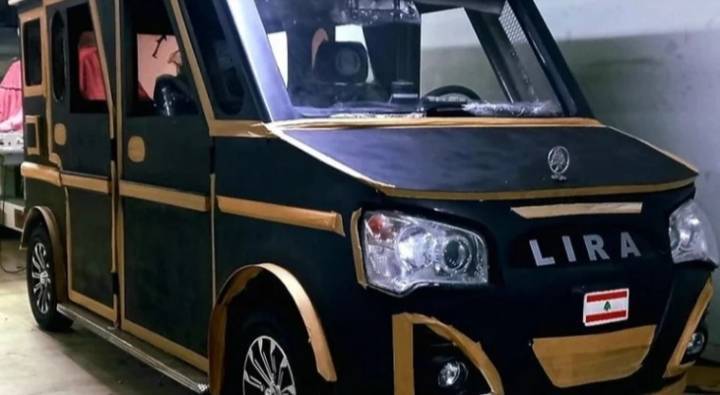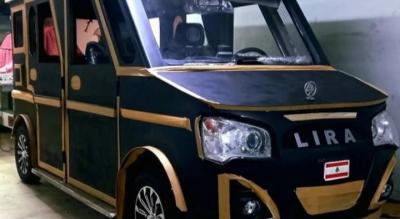This is not the only innovation we hear about in a series of unique and innovative industries that are purely "Lebanese-made", aiming to address the economic crisis with better solutions instead of merely containing it through whatever means available. This is particularly in light of the rising fuel costs, which have been changing price twice a day via a schedule issued by the Ministry of Economy due to the instability of the dollar exchange rate and market speculation, as well as fuel shortages amid long queues at gas stations.
Mechanical engineer Hicham Hassami launched his project, which relies on solar energy as an alternative to petroleum products and private generators or state electricity that only provides power for about an hour a day. The crisis has sparked a wave of creativity. Hicham, 46, told Al-Diyar, "Essentially, my work is based on inventing and repairing industrial machinery, and the idea of designing a solar-powered vehicle arose from the series of economic crises and aftershocks we are experiencing day by day, especially after the Turkey earthquake where the aftershocks exceeded 1,500 tremors. The current situation in Lebanon has negatively affected all social segments and vital sectors, which led to the creation of a solar-powered car, a unique innovation and the first of its kind in the Arab world in the automotive industry."
He continues, "The design of my first model in this field is an electric vehicle that charges itself through solar energy. This idea settled in my mind for two months, and I executed it within four months."
**"Lira" Car to Support the Currency and Economy**
Hicham named this first invention "Lira" to support the Lebanese currency and national economy. In the center of the vehicle is the Lebanese cedar known for its resilience and dignity, steadfast against natural elements or political aftershocks, which serves as the slogan for my car. He adds, "This exceptional car, in its design and function, is a source of pride for every Lebanese."
**Selling in Dollars or Lira?**
In this context, Hicham says, "We will launch it in the market by the end of February, and this innovation is a glimmer of hope for Lebanese people and every individual facing difficult challenges, continuous economic shocks, and the repercussions of the dollar, which keeps devaluing our currency." He adds, "It will be sold in Lebanese lira and not in dollars, as is happening in various sectors today with the comprehensive dollarization. On the other hand, those intending to purchase it must exchange their dollars for Lebanese currency, emphasizing that this initiative will help restore vitality to the economic sectors and accelerate their pace while also restoring the moral value of our currency.”
Hicham continues, “I emphasize that this car will be exported and sold exclusively in the national currency, which will consequently increase the demand for the lira, leading to its natural position against the US dollar.” He notes that the price will range between $10,000 and $15,000 if a second battery is added to allow for a 400-kilometer range, depending on the additional features.
**Suitable for Public Transport**
In this regard, Hicham states, “Of course, this car can be used for public transport or to transport school and university students, and even for delivery services, making it a viable transportation method, equipped similarly to traditional cars while comfortably seating four or five individuals.” He points out a very important aspect of this car: it meets all internationally recognized standards.
**How It Works**
Hicham explains the workings of the electric car, saying, "In addition to charging itself, it should ideally operate under sunny conditions and not be cloudy or rainy. In such cases, an individual will need to rely on electricity to charge it, which takes no more than 30 minutes via a standard power outlet, particularly in winter when drivers need to adopt this method." He continues, “It can travel around 200 km, which is sufficient for four consecutive days without needing a recharge if we consider we travel 50 km a day." He emphasizes, "If the weather is clear, there won’t be a need for electrical charging, especially given the persistent power outages throughout the day in Lebanon."
**Lighting Homes and Shops**
Hicham also discusses the possibility of supplying electricity from this car to a home or a commercial establishment, provided it doesn’t exceed the lighting of a bulb or powering a television. However, he notes that it can't operate all electronic devices due to the additional power required.
**Difference Between It and the Tuk-Tuk**
Hicham points out, "There is a vast difference between the Tuk-Tuk, which is essentially a lightweight vehicle made with thick nylon doors, making it a low-cost transport option but one that is unsafe." He adds, "There is no comparison between the ‘Lira’ car with its optimal design and specifications and the numerous risky Tuk-Tuks that spread across neighborhoods and roads."
Hicham concludes, "The 'Lira' car has complete features that are globally recognized and deserves consideration from those interested in savings, supporting the Lebanese economy and currency, and those committed to clean energy as it operates zero pollution.”




